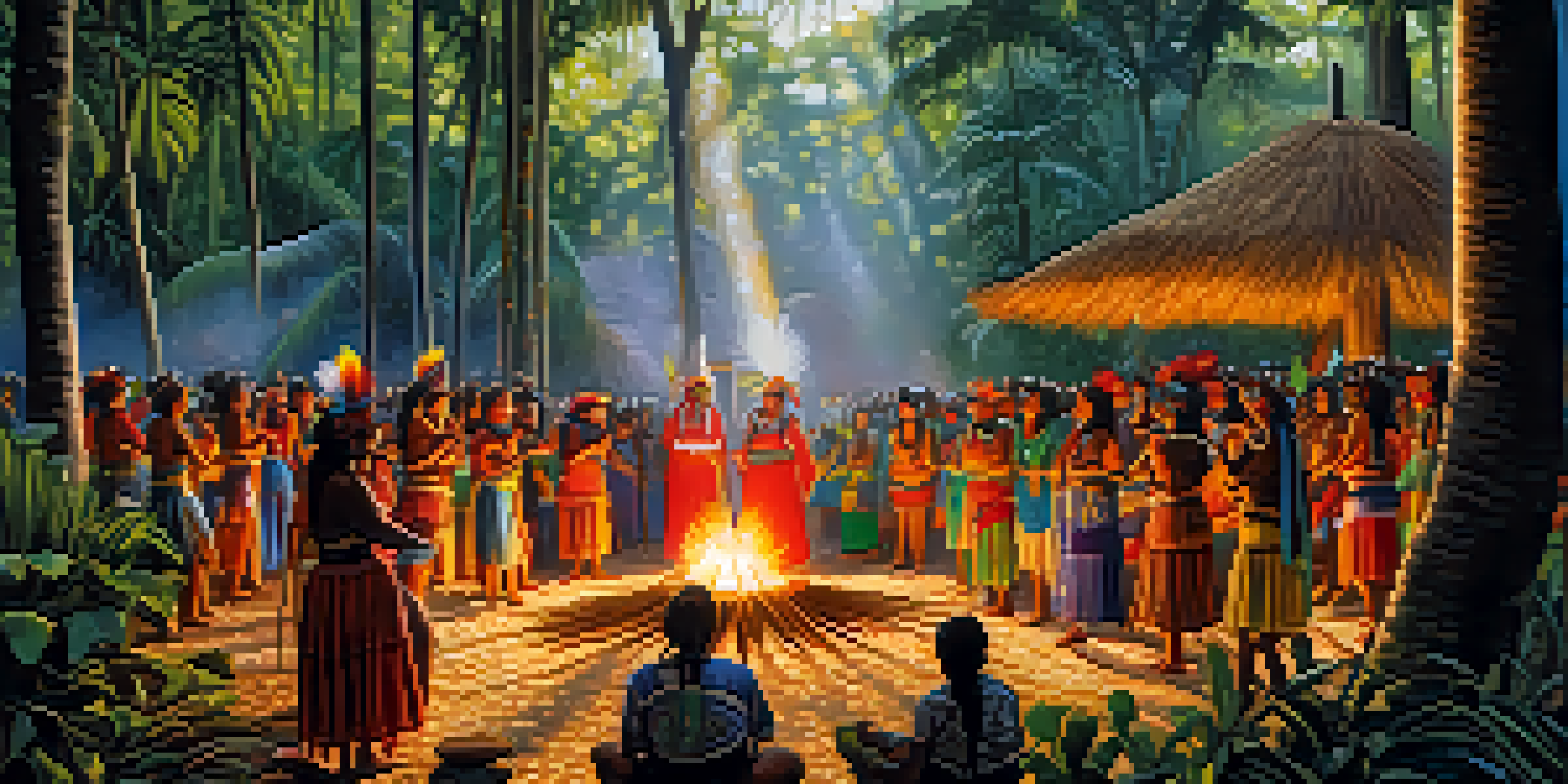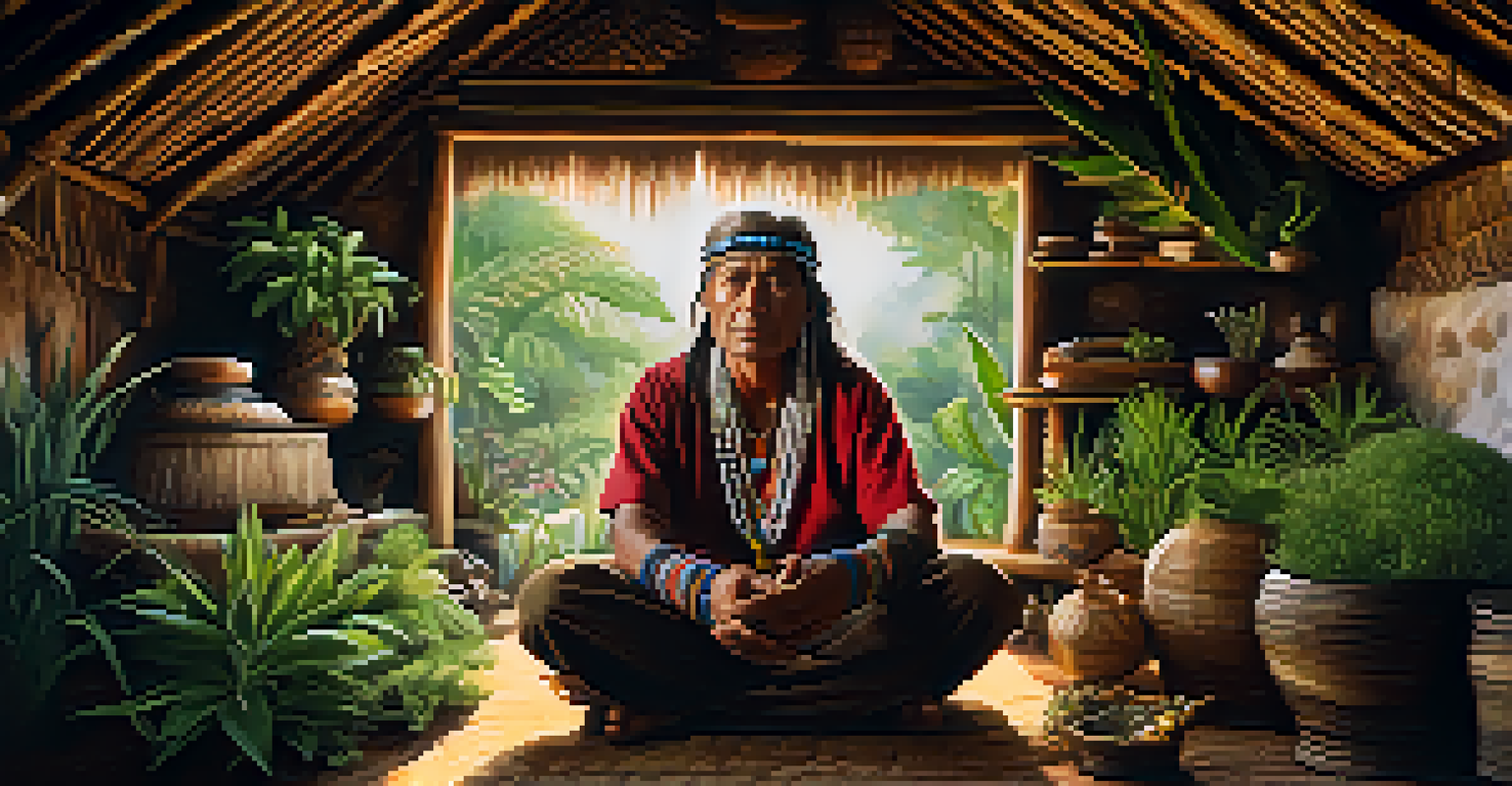The Spiritual Beliefs of Brazil's Indigenous Peoples

Introduction to Brazil's Indigenous Spirituality
Brazil is home to a diverse array of indigenous peoples, each with their own unique spiritual beliefs. These beliefs are deeply intertwined with their daily lives, shaping their rituals, customs, and worldviews. For many, spirituality is not just a separate aspect of life but a fundamental part of their identity and connection to the land.
The earth has music for those who listen.
Indigenous spirituality in Brazil often revolves around a profound respect for nature. This connection manifests through various rituals and practices that honor the earth, animals, and plants. Understanding these beliefs requires acknowledging the intricate relationship between these communities and their environment.
As we explore these spiritual beliefs, we can see how they reflect the values and traditions of indigenous cultures. This journey offers a glimpse into a world where the sacred and the mundane coexist, revealing the rich tapestry of Brazil's indigenous heritage.
Cosmology and Creation Myths
At the heart of many indigenous beliefs are cosmologies that explain the origins of the world and humanity. These creation myths vary widely among different tribes but often share common themes, such as the emergence of the earth from water or the role of animal spirits in creation. For instance, the Tukano people tell stories of how the first humans came from the union of the earth and the sky.

These narratives serve not only as explanations of existence but also as moral guides. They teach values such as harmony, respect for nature, and the importance of community. In this way, cosmology plays a crucial role in shaping the ethical framework of indigenous peoples.
Nature's Central Role in Spirituality
Brazil's indigenous spirituality emphasizes a profound respect for nature, viewing it as sacred and fostering a deep sense of environmental stewardship.
Additionally, these myths are often recounted through oral traditions, songs, and dances, reinforcing their significance within the culture. This storytelling aspect not only preserves the beliefs but also strengthens communal bonds, as everyone participates in the shared narrative.
Role of Nature in Spiritual Practices
For Brazil's indigenous peoples, nature is not merely a backdrop to their lives; it is a central character in their spirituality. Natural elements like rivers, mountains, and forests are often seen as sacred, inhabited by spirits that require respect and reverence. This belief fosters a deep sense of stewardship for the environment, as harming nature is believed to invite negative consequences.
Indigenous people have a deep relationship with the land, which is not only a source of sustenance but a sacred space that holds their culture and identity.
Many rituals involve offerings to these spirits, such as food, flowers, or crafted items, which serve to maintain harmony between the natural and spiritual worlds. For example, during certain festivals, communities gather to perform ceremonies that honor the spirits of the land, reinforcing their connection to nature.
This spiritual relationship with nature is not only about reverence but also about reciprocity. Indigenous peoples believe in giving back to the earth, which is a fundamental principle that guides their interactions with the environment and promotes sustainability.
Rituals and Ceremonies
Rituals and ceremonies play a vital role in the spiritual lives of Brazil's indigenous peoples. These events mark significant life stages, such as birth, coming of age, marriage, and death, and are often accompanied by elaborate traditions. For instance, the Yawanawá tribe holds vibrant rituals that celebrate the transition from childhood to adulthood, reinforcing community ties and cultural identity.
Ceremonies often involve music, dance, and the use of sacred plants, such as ayahuasca, which is believed to facilitate communication with the spiritual realm. These experiences are not just about individual enlightenment; they foster a sense of unity within the community, bringing people together to share in the collective spirit.
Importance of Rituals and Ceremonies
Rituals and ceremonies are vital in marking significant life stages and fostering community ties, serving as a means of cultural identity and resistance.
Moreover, these rituals can also serve as a means of resistance against cultural erasure. By maintaining their spiritual practices, indigenous communities assert their identity and heritage, ensuring that their traditions endure for future generations.
Shamanism and Spiritual Leaders
Shamanism is a prominent aspect of many indigenous cultures in Brazil, with shamans acting as intermediaries between the physical and spiritual worlds. These spiritual leaders are revered for their knowledge of medicinal plants, rituals, and the ability to communicate with spirits. Their roles are critical in guiding communities through challenges, whether they are personal, social, or environmental.
The shaman's practices can include healing rituals, divination, and leading ceremonies. They often enter altered states of consciousness, facilitated by traditional plant medicines, to gain insights or guidance from the spirit world. This practice emphasizes the interconnectedness of all beings and the importance of balance.
Through their work, shamans not only heal individuals but also reinforce the cultural values of the community. They play a crucial role in maintaining the spiritual health of their people, demonstrating how deeply intertwined spirituality and community life truly are.
Impact of Colonization on Spiritual Beliefs
The arrival of European colonizers profoundly impacted the spiritual beliefs of Brazil's indigenous peoples. Many traditional practices were suppressed or outright banned, leading to a loss of cultural identity for some communities. However, despite these challenges, many indigenous groups have managed to preserve and adapt their spiritual beliefs in the face of adversity.
Some tribes have blended their traditional practices with elements of Christianity or other religions, creating unique syncretic forms of spirituality. This adaptability highlights the resilience of indigenous cultures and their ability to navigate the complexities of modern life while holding onto their roots.
Resilience Amid Colonization Challenges
Despite the impacts of colonization, many indigenous communities have preserved and adapted their spiritual beliefs, highlighting their resilience and cultural pride.
Today, there is a growing movement to revive and celebrate indigenous spiritual traditions. Many communities are reclaiming their practices, educating others about their beliefs, and fostering a renewed sense of pride in their heritage.
Contemporary Spiritual Movements
In recent years, there has been a resurgence of interest in indigenous spirituality, both within Brazil and globally. Many indigenous leaders are advocating for the recognition of their spiritual beliefs as essential to their cultural identity. This has sparked a broader dialogue about the importance of indigenous knowledge systems in addressing modern issues such as climate change and social justice.
Contemporary spiritual movements often emphasize the teachings of ancestral wisdom, focusing on themes of interconnectedness and sustainability. These movements encourage not only indigenous peoples but also non-indigenous individuals to reconnect with nature and recognize the spiritual dimensions of environmental stewardship.

As these movements gain momentum, they are fostering greater respect and understanding for the rich spiritual heritage of Brazil's indigenous peoples. By sharing their beliefs and practices, indigenous communities are paving the way for broader cultural appreciation and advocacy.